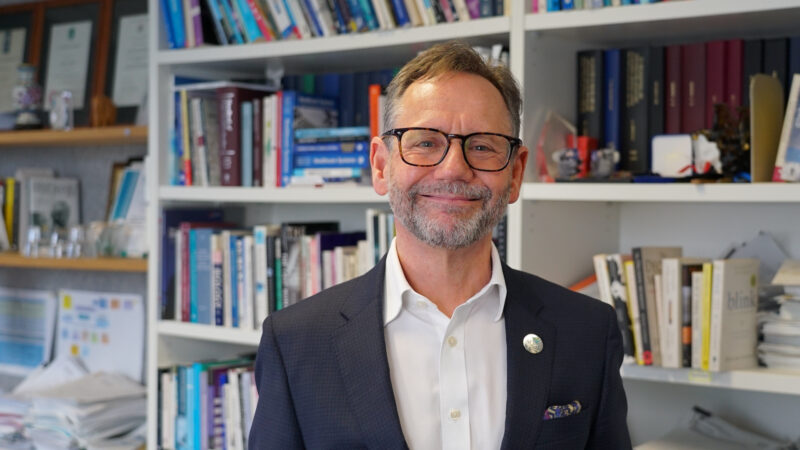In April 2023, Professor John Skerritt retired from his position of Deputy Secretary Health Products Regulation Group, a role he has been in since 2012. During his time at the TGA he had line responsibility for over 1200 staff involved in the regulation of therapeutic goods, regulation of gene technology and industrial chemicals and control of drug import, export and production.
During the COVID-19 pandemic he was part of the “public face” for media and community groups, conducting over 100 interviews, seminars and media conferences, including with the Prime Minister and Health Minister.
He became synonymous with, and the public face of, the Therapeutic Goods Administration, leaving behind an extraordinary record of public service.
During this time it was his reassurances that left Australians confident in the approval and regulation of medicines, vaccines and treatments.
“Professor Skerritt has had many achievements over the course of his career including Implementing the Medicines and Medical Devices Review, digital transformation, the regulation of medicinal cannabis, the rapid registration of COVID vaccines and treatments and playing a leading role in international harmonisation of regulation.”, said The Hon Mark Butler MP, Minister for Health and Aged Care in a press release issued in February the same year.
At this year’s ARCS 2023 Conference, ARCS Australia CEO Dr Shanny Dyer paid tribute to Professor Skerritt and his service to the Australian health industry. She led a tribute with fellow industry heads, Elizabeth de Somer, CEO, Medicines Australia, Anne Harris, Managing Director, Pfizer Australia & New Zealand, Deon Schoombie, CEO, Consumer Healthcare Products Australia, Ian Burgess, CEO, Medical Technology Association of Australia and Arthur Brandwood, President ARCS Australia.
About ARCS and its transformation in 2023
ARCS Australia is the association for people working on the development of therapeutics. The ARCS conference brings over 1500 people across the sector, in Australia, with international speakers coming this year. The conference runs over 3 days with 7 concurrent streams that cover all the areas that are involved in the development of therapeutics, including clinical research, regulatory affairs and pharmacovigilance.
The focus for ARCS at this year’s conference has been building competency frameworks in the areas that members work. As a significant step, ARCS is transforming into a professional body that both recognises and develops people into specific competencies that are required for the roles that those people are undertaking.
Dr Shanny Dyer states, “One of the key goals that ARCS is undertaking over this strategic period is to implement the professionalisation of our sector. Whilst we’ve been very clearly developing products that have safety, quality and efficacy, we now need to work on the quality of our staff, their ability to develop products and have a safe pair of hands and to work efficiently as well.”
You Might also like
-
Priming Australia for social prescribing
Social prescribing provides support in various areas of people’s lives, leading to increased confidence, improved navigation of systems, and enhanced friendships and trust in healthcare, while communities should be designed in an age-friendly way to prevent isolation.
In Part 1 of the Models of Care on Social Prescribing, Australian Health Journal spoke to 4 people advocating for social prescribing in Australia
-
Misinformation impacts routine vaccines
More significant changes in recent years have been health-related misinformation eroding trust in healthcare professionals, leading to people seeking alternative treatments or avoiding medical advice altogether. This can make it more difficult for healthcare professionals to provide effective treatment and care.
Recent vaccines delivered as part of the COVID-19 response, are having a consequential impact on the uptake of routine vaccines.
Australian Health Journal spoke with Dr Paul Griffin, an Infectious Diseases Physician and Microbiologist at Mater Health, and who has been involved in over 150 clinical trials in the field of infectious disease.
Paul talks about the importance of having reputable sources of information that can used to encourage people to understand what is involved in clinical trials and the roles of vaccines.
-
Australian Healthcare and Hospitals Association Health Services and Systems Hospitals and Clinics New Content Patients
Professor Jeffrey Braithwaite on patient safety and health systems improvement
Professor Jeffrey Braithwaite is Founding Director of the Australian Institute of Health Innovation, Director of the Centre for Healthcare Resilience and Implementation Science and Professor of Health Systems Research at Macquarie University.
Professor Jeffrey Braithwaite is a leading health services and systems researcher with an international reputation for his work investigating and contributing to systems improvement.
The Australian Healthcare and Hospitals Association (AHHA) recently announced it will award the 2021 Sidney Sax medal for outstanding contributions to the development and improvement of Australia’s healthcare system to Professor Jeffrey Braithwaite.



